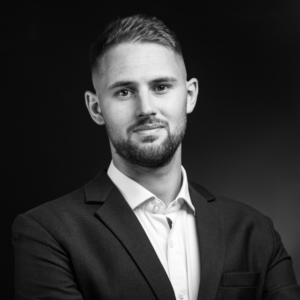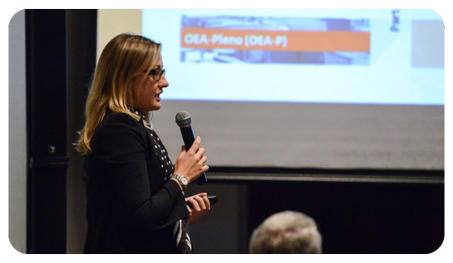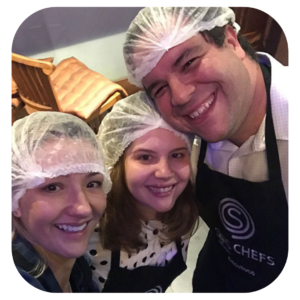Harvey John
Unit 2 Ferry Wharf
Hove Enterprise Centre
Basin Road North
Portslade, East Sussex
BN41 1BD
Time and time again, we’re asked by junior candidates what it takes to reach the senior grades within the indirect tax world. And rather than give you our answer, we thought it would be best if we shared the views of those who have been there and done it!
Fernanda, first off, thanks for taking the time to share your journey with us and aspiring indirect tax professionals! As this interview is about your story, can you give us a brief background?
Thanks for sharing this, Alex. At 17, I graduated from High School in Brazil and opted to apply to Law University. At that time (1998), Mercosur was a trending topic in the region, so I combined my Law studies with a technical course in international trade. My internship for the technical course was at Bayer S/A in the Supply Chain Department.
At Bayer, I was dealing with the practical aspects of the customs and trade work – but missing the application of the legal expertise I was gaining from University. Upon joining Ernst & Young in Brazil, I finally had the opportunity to combine both practical and legal expertise as a consultant for the Customs & International Trade Department. This is when my passion for Customs started.
It’s quite a trend to see that people tend to fall into Customs – so it’s refreshing to see that you created that path yourself. What’s life like now that you’ve come to lead a Legal Trade function?
What makes me most enthusiastic about working with Customs and Trade is that it’s all (or will be!) based on harmonized provisions – this is by nature a global career. Professionals in this area speak the same language – though in different ways. The position of Legal Director empowers me to interact with different industries at all business levels. Working with international organizations and government officials enables me to exercise my analytical mindset in comprehending the legal provisions and translating those into workable and compliant solutions.
From a people management perspective, being responsible to educate and coach young professionals in this area is certainly an opportunity I don’t take for granted. They’re the future!
I couldn’t agree more. I find it a very rewarding task to influence the up-and-comers. Now, you’ve been in their shoes before – would you say there’s anything in particular that helped you move up the ladder?
The years of experience in both industry and advisory sectors in various jurisdictions; the proven experience in the area, which I was only able to achieve because of my learning aptitude.
From a management perspective, the delegation skills combined with my passion for coaching professionals and working 360 degrees with all colleagues helped me become more invested in people.
Your attitude and your aptitude determine your altitude – something very applicable in any field. Aside from the raw passion and the extensive experience, would you say you actively seek information outside of work?
Oh, definitely! In the area of global customs and trade, you must be self-educated and keep active in absorbing new information. This is an area in constant evolution which requires self-education to quickly absorb, interpret, and translate the legislation into workable solutions.
That’s something I’d say is very prominent in the indirect tax world as a whole. Now it’s extremely common for people at your level to operate outside of a routine – do you have one yourself?
There are spot engagements – which may come from a telephone call with a client or an e-mail, but also from a colleague in another practice area. These generally require immediate attention and a timely response. I also have larger projects which last for a longer period of time and may require weeks of analysis before the final advice is delivered. Multi-country projects generally are the most challenging ones – but also the most interesting ones.
Deliverables can be in different formats – practice guides, Memos, Legal opinions, PowerPoint presentations, excel matrices, and flowcharts. In parallel, in this position I’m also responsible for creating new opportunities and developing business – which includes, but is not limited to, participation in Conferences and Seminars as a speaker or moderator, writing technical articles, sending newsletters to clients, and pitching for new business.
Prior to any engagement, we always conduct business case analyses in order to provide an engagement letter to the client. The management of the practice area itself (e.g. budget management, P&L, and other administrative routines) are mainly led by the respective Managing Partner, with support from the Legal Director as appropriate.
As this is targeted towards advice, do you have any words of wisdom you’d like to share?
Develop excellent verbal, writing, and advocacy skills in the area.
The more years of experience you gain, the better prepared you are to delegate and coordinate work. Delegation isn’t an easy task, but to hold a leadership position you have to be good enough to deliver the same quality of work through your team that you would have delivered if done by yourself.
The passion behind your work, I might say, can also make a difference! Since you’ve worked in global customs, do you have any career inspirations?
From a technical perspective, Fabiana Heitman, my mentor and manager at Ernst & Young and Nicole Looks, currently the Principal I’m working with at Baker McKenzie. From a people-person perspective, Cesar Finotti, VP for STTAS, a UPS Company, is my former employer in Brazil.
They’ve all made different impacts on my career, and I’ll always be inspired by their influence.
Now we’re looking into releasing a list of recommended reads – Do you have any books you live by?
Thank you again, Fernanda, for sharing your journey and your advice!
—
Are you at the senior level within Indirect Tax? If so, we’d love to hear about your experiences and share them with our global tax network.
Search our latest tax jobs here.
If you would like to see our company updates and industry insights, follow our LinkedIn page here.
Author

From boutiques to the Big 4, and start-ups to multinational corporations, Alex manages a diverse portfolio of clients worldwide which has enabled him to develop a vast global network of indirect tax and tax technology professionals in 40+ countries.



